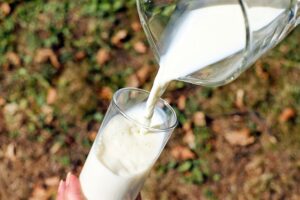The Benefits of Drinking Milk: A Nutritional Powerhouse
Milk has been a staple of human diets for centuries, making it one of the most nutritious and versatile beverages. Whether consumed as a standalone drink or incorporated into recipes, milk offers numerous health benefits that contribute to overall well-being. Here’s a closer look at why milk deserves a spot in your daily diet.

- Rich Source of Essential Nutrients
Milk is packed with essential nutrients that support the body’s growth, development, and maintenance. A single glass of milk contains:
- Calcium: Vital for strong bones and teeth, calcium also supports muscle function and nerve signaling.
- Protein: High-quality protein in milk helps build and repair tissues, making it crucial for muscle health.
- Vitamins: Milk is rich in vitamins such as B12 (for red blood cell production) and vitamin D (for calcium absorption and immune support).
- Minerals: Magnesium, potassium, and phosphorus in milk contribute to bone health, muscle function, and electrolyte balance.
- Bone and Teeth Health
Calcium, along with vitamin D, plays a significant role in maintaining bone density and preventing conditions like osteoporosis. For children, milk supports proper bone development, while for adults, it helps maintain strength and reduce the risk of fractures.
- Weight Management
Milk can be an ally in managing weight. Studies suggest that the protein in milk can promote a feeling of fullness, reducing overall calorie intake. Low-fat or skim milk options provide the benefits without the extra calories and fat.
- Supports Muscle Recovery
For those who are active or engage in regular exercise, milk is an excellent post-workout drink. The combination of protein and carbohydrates aids in muscle recovery replenishes glycogen stores, and promotes muscle repair.
- Improves Heart Health
Milk contains potassium, which helps regulate blood pressure by counteracting the effects of sodium. Regular consumption of milk, especially low-fat varieties, may lower the risk of hypertension and support cardiovascular health.
- Boosts Immune System
The presence of vitamins A and D, along with other immune-boosting nutrients in milk, can enhance the body’s ability to fight infections. These nutrients support healthy skin and mucous membranes, the body’s first line of defense against pathogens.
- Promotes Hydration
Milk is about 87% water, making it a hydrating beverage. It’s a great choice for replenishing fluids after physical activity or on a hot day.
- Versatility in Diet
Milk is not just for drinking; it’s a versatile ingredient in countless recipes. From smoothies and soups to desserts and baked goods, milk enhances flavor, texture, and nutritional value.
- Accessible and Affordable
Compared to many other nutrient-dense foods, milk is widely available and affordable, making it an excellent option for families seeking cost-effective ways to meet nutritional needs.
Considerations:-
While milk is highly beneficial, some individuals may have lactose intolerance or a milk allergy. Fortunately, lactose-free milk and plant-based alternatives like almond, soy, or oat milk can provide similar benefits, though they may lack some of the nutrients found in cow’s milk.
Conclusion:-
Incorporating milk into your diet is a simple yet powerful way to enhance your nutritional intake. Whether you prefer a cold glass of milk with cookies or use it as a base for your morning oatmeal, milk offers a host of health benefits that make it a valuable addition to your daily routine.



